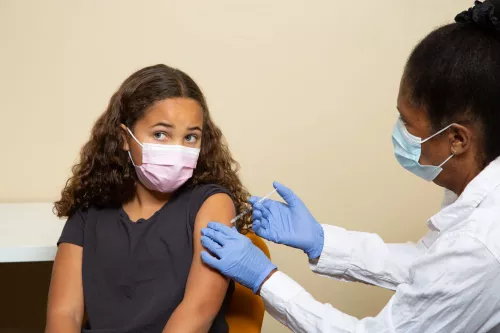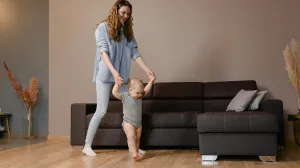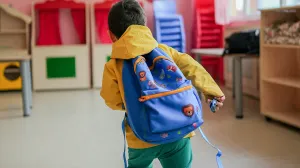
COVID-19 vaccines have undergone – and will continue to undergo – the most intensive safety monitoring in U.S. history. Vaccinating children will help protect them from getting COVID-19 and therefore reducing their risk of severe disease, hospitalizations or developing long-term COVID-19 complications. Getting your children vaccinated can help protect them against COVID-19, as well as reduce disruptions to in-person learning and activities by helping curb community transmission.
Dr. Adam Weston is a board-certified infectious disease physician with Lowell General Hospital. Here he answers commonly asked questions about vaccines for kids age 5-11.
Pediatric Vaccine (kids age 5-11)
Is the Pfizer COVID-19 vaccine safe for children 5-11 years of age?
The vaccine’s safety was studied in a clinical trial for children ages 5 through 11 and to date no serious side effects have been reported in those who received the vaccine.
Is the Pfizer COVID-19 vaccine effective in children 5-11 years of age?
Yes. The vaccine appears to be as effective at preventing symptomatic COVID-19 infection as in adults.
How is the vaccine different for kids + adults?
In this age group, it is a smaller dose – about 1/3 of that for people 12 and up. But like teens and adults, kids will get two shots at least 21 days apart.
What are the benefits of vaccination?
There is a lot of good data to show the benefit outweighs the risk, for a variety of reasons. Not only does it protect children as well as it does adults, but it also decreases the transmission to other people, reducing everyone’s overall risk and helps us all get our lives back to normal. Children have now taken on an increased role as vectors of the virus.
Are there kids who should not get the vaccine?
It’s the same with children and adults. If the child has had a severe allergic reaction (anaphylaxis) to a known component of these vaccines (which is very rare), consult your healthcare provider before getting the child vaccinated. But it is otherwise proven to be safe and effective.
What are some common side effects in children after receiving a COVID-19 vaccine?
Side effects are generally mild to moderate in severity. The most common are pain at the injection site, fatigue, fever and headache. These are similar to the ones observed in those 12 years of age and older, occurred within two days after vaccination and resolved within one to two days.
In trial data, these symptoms were less severe and less frequent than in teens and adults, possibly due to the smaller dose.
Should I be concerned about the rare side effect of myocarditis (swelling of the heart lining)?
No. In fact, kids are far more likely to get myocarditis as a symptom of COVID. As a vaccine side effect, it’s extremely rare in kids – about 50 per million in young adults – and when it does happen is easily treated and generally does not result in long-term complications. In general, myocarditis for any reason is less common in this younger age group and we suspect this may be true of vaccine-related myocarditis as well.
Can my child get the flu + COVID vaccines at the same time?
Yes. We have a long history of kids getting lots of vaccines all at the same time.
Is COVID dangerous for kids?
It is less dangerous than for older adults, but it’s still dangerous, and some kids who do get it are experiencing long-term complications. The American Society of Pediatrics has data showing that there have been more than 6 million infections in children, including 1.3 million since the beginning of September. We are also seeing more kids hospitalized, and in very rare cases, children have died.
If my child already had COVID-19. Should he or she be vaccinated?
There is evidence of additional benefit to getting the vaccine on top of the natural infection. Children just have to be off isolation and no longer infectious before getting the vaccine.
Where can I get my child’s vaccine?
Some primary care providers are offering the vaccine to their patients. You can also check with your local pharmacy chain or visit vaccines.gov to find a vaccination site near you.


